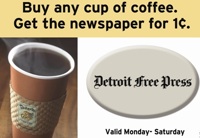 The Detroit Free Press recently staged a promotion with Panera, the baked-goods purveyor, that offers a nice lesson in the economics of charging for news. Patrons who purchased a cup of coffee could also grab a copy of the Freep for a penny. More than 1,600 people took advantage of the offer each day, according to the Newspaper Association of America, and single-copy sales of the Freep, which recently curtailed home delivery, remained elevated after the promotion ended.
The Detroit Free Press recently staged a promotion with Panera, the baked-goods purveyor, that offers a nice lesson in the economics of charging for news. Patrons who purchased a cup of coffee could also grab a copy of the Freep for a penny. More than 1,600 people took advantage of the offer each day, according to the Newspaper Association of America, and single-copy sales of the Freep, which recently curtailed home delivery, remained elevated after the promotion ended.
Sounds like a smart promotion, but consider how it worked: charge for the coffee and give away the news. (They asked for a penny to count the copies as circulation under ABC’s recently loosened standards.) Economists will tell you that it’s easy to put a price on a private good like coffee because you can’t drink from my cup of joe once I’ve consumed it. But news is an information or public good, which means it lacks both rivalry (you can have the same news as me) and exclusion (you can obtain the news without paying for a newspaper). I’m cribbing here from Jay Hamilton’s book, All the News That’s Fit to Sell, which we discussed extensively in February.
There will always be a disconnect among the fixed costs of producing a newspaper (high), the value that society places on news (high), and the amount that economic theory says you can charge for an information good (nothing). So long ago, newspapers got into the business of selling a private good, its readers’ attention, to advertisers. That’s why the eyeball-maximizing penny press emerged in the 1830s and returned this year to Detroit.